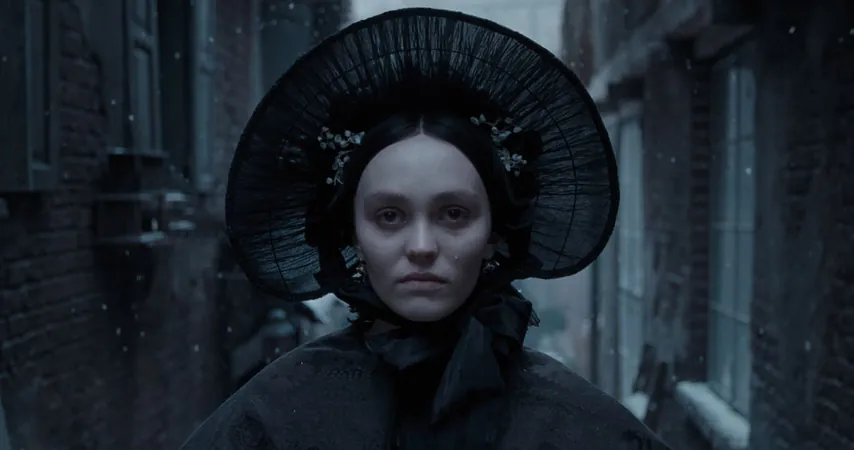
Ellen's Empowering Transformation in Nosferatu: A New Era for Female Agency
2024-12-24
Author: Chun
Ellen's Empowering Transformation in Nosferatu: A New Era for Female Agency
In the chilling world of vampire cinema, the name "Nosferatu" resonates profoundly, especially with the release of Robert Eggers' modern reimagining set to captivate audiences in 2024. This latest iteration not only pays homage to F.W. Murnau's groundbreaking 1922 silent classic but also refreshes the narrative by infusing it with a compelling focus on female agency—specifically through the character of Ellen.
Unlike her counterpart in the original film, Ellen, portrayed by Lily-Rose Depp, undergoes a radical transformation from a victim to a figure of empowerment. In Murnau's version, Ellen is simply a pawn in her husband's service, a willing sacrifice merely defined by her relationship to him. Eggers, however, breathes new life into her character, positioning her as a complex individual in pursuit of redemption for herself rather than for her husband, Thomas (Nicholas Hoult).
Eggers has cultivated a reputation for crafting multidimensional female characters who grapple with the constraints of patriarchal societies. Themes of betrayal, desire, and female autonomy weave through his filmography. Remember Thomasin from *The Witch*? Her fight for agency against her family’s oppressive beliefs mirrors Ellen's journey in *Nosferatu*. Queen Gudrún from *The Northman* only adds to Eggers’ portrayal of women in charge of their destinies, navigating the grey areas of morality and desire.
In this new adaptation, Ellen's character arc culminates in a profound exploration of consent. Her fate takes a dramatic turn as she no longer merely dies to save her husband; instead, she confronts her past relationship with Count Orlok, the titular vampire, with a fierceness that empowers her. The narrative frames Ellen's fatal decision not as a martyrdom but as a reclaiming of agency. She is not just a damsel in distress; she actively seeks to regain control over her life and confronts the monstrous figure that haunts her—a portrayal that resonates deeply in today's conversations about consent and autonomy.
Eggers' version reinterprets the vampire mythos, positioning Nosferatu as a metaphor for obsession and manipulation. The film portrays him as a stalker and a toxic presence in Ellen's life, with their interactions reflecting themes of emotional and physical control—elements that add a gritty realism to her struggles. As Ellen wrestles with the surreal nightmares and haunting visions that Nosferatu imposes upon her, she evolves from a woman trapped by circumstances into a figure of defiance and empowerment.
Unlike the original tale, where Ellen’s identity revolves solely around Thomas, Eggers’ screenplay gives her the agency to make decisions about her life. The climax unfolds with Ellen not merely being a passive participant but as an active agent analyzing her choices, allowing for a rich emotional landscape that showcases her internal conflict and determination.
In a marked contrast to Murnau's interpretation, where Ellen's story is often overshadowed by Nosferatu's sinister presence, Eggers ensures that Ellen's motivations and desires are articulated. The film depicts her haunted past, showing her vulnerability but also her strength. Female characters surrounding her, such as Anna (Emma Corrin) and the brave women guiding Thomas, underscore the narrative's emphasis on sisterhood, support, and fighting back against the darkness surrounding them.
Eggers' *Nosferatu* not only revitalizes a classic horror tale but also reshapes its central female character into a harbinger of strength and autonomy. It becomes a tale not of victimhood but of empowerment and reclamation, allowing Ellen to transform into a complex character who confronts the malevolent forces in her life by taking charge of her fate. As we approach the release, this new vision heralds a thrilling chapter in the portrayal of women in horror—a genre ripe for evolution that Eggers is poised to deliver.


 Brasil (PT)
Brasil (PT)
 Canada (EN)
Canada (EN)
 Chile (ES)
Chile (ES)
 España (ES)
España (ES)
 France (FR)
France (FR)
 Hong Kong (EN)
Hong Kong (EN)
 Italia (IT)
Italia (IT)
 日本 (JA)
日本 (JA)
 Magyarország (HU)
Magyarország (HU)
 Norge (NO)
Norge (NO)
 Polska (PL)
Polska (PL)
 Schweiz (DE)
Schweiz (DE)
 Singapore (EN)
Singapore (EN)
 Sverige (SV)
Sverige (SV)
 Suomi (FI)
Suomi (FI)
 Türkiye (TR)
Türkiye (TR)